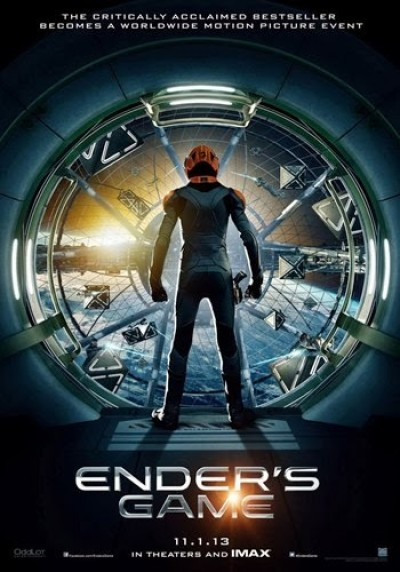“The enemy’s gate is down”
While speaking during a Q&A at the Los Angeles Times Festival of Books in April, author Orson Scott Card stated that Gavin Hood‘s adaptation of his seminal novel Ender’s Game was “the best that good people could do with a story they really cared about and believed in.” He also went on to say it was “damn good,” a sentiment with which I can’t wholly agree. The first quote, however, is a pretty spot-on description when you consider the amount of detail and political unrest written into his story back in 1985 and the constraints a two-hour movie enforces. If I were to give a succinct soundbyte about the cinematic version I’d probably say something like “a popcorn version of an intellectual social commentary that brings the surface to life while sadly leaving its underlying message behind.”
The truth is that I had a completely different statement going through my mind during its first half. Robotically militaristic acting and clumsy expository dialogue aside—think how dry a direct reading of the book’s argumentative chapter openings between Colonel Graff (Harrison Ford) and Major Anderson (Viola Davis) could be and you’ll get the idea—Hood actually does a good job condensing a lot of information into a very short period of time so audiences can begin to understand the state of Earth in context to the story. Important characters are introduced prematurely and certain crucial actions happen out of order, but each alteration streamlines the excess and gets us to the meat of Ender Wiggin’s (Asa Butterfield) training. People would be mad details were changed, but they couldn’t argue the moves didn’t suit the medium.
We meet young Ender at school under the International Fleet’s gaze (Graff and Anderson). We watch how he takes the disappointment of washing out of the program—one he was born to graduate being that he is a legally sanctioned “third” in a world with a strict two child quota—and the tactical destruction of an enemy when left defenseless and alone. He truly is a combination of his sister Valentine’s (Abigail Breslin) compassion and brother Peter’s (Jimmy Pinchak) sociopathic violence, possessing enough love and hate to understand his enemy and discover its weaknesses. And being that he is Earth’s last hope of winning a war against an alien race of insect-like Formics (not called “Buggers” like in the book), his reinstatement by Graff into Battle School is a foregone conclusion. How he performs, however, is not.
And this is the part in which the novel really hits its stride. We read how Ender deals with adversity, bullies, and purposeful isolation tactics meant to hone his survival instincts and ability to lead. He earns his allies, earns his stripes, and eventually proves worthy of the accolades bestowed upon him by top brass behind closed doors. Unfortunately, though, while the beginning of the film trims the fat, this second half simply tears it away with whatever flesh remains attached. What was lean and direct becomes a veritable Cliff Notes removing all notion of a World War brewing back home, turns the impressively nuanced and layered characters of Valentine and Peter into a wasted angel and devil on their brother’s shoulders, and strips away every bit of strategic genius that made Ender who he is.
I know movies can’t retain every detail from a full-length novel, but you can’t remove portions of the story necessary to its lead’s development. If I hadn’t read it I might have been confused by what was happening because Ender evolves from last picked to Commander in the blink of an eye without even a montage to show how. We get one fight with him as a nobody and one as mankind’s anointed savior—that’s it. We’re just supposed to blindly accept his victories aren’t due to dumb luck despite them playing out like they are. And then Hood does something I simply cannot forgive when he turns a critical moment of rage into a accident so our “hero” can be broadly painted as sympathetic rather than implicitly so through the performance afterwards.
This is a key problem: Hood simply can’t get the performances these children need to pop off the screen as more than brainwashed child soldiers playing emotionless instead of conflicted. Without practice battles for Ender, Petra (Hailee Steinfeld), Alai (Suraj Partha), and Bean (Aramis Knight) to gel together, however, I’m not sure they ever could. The filmmakers are so intent on getting us to Command School to unleash the force Ender’s training has made him that they forget he has to earn it. Tearful remorse can’t replace his analytical pragmatism on the page and insolently stone-faced frustration is a poor substitute for intelligently calculated strategy. Card was exactly right when he said, “if you don’t know what’s going on inside Ender’s head, then it’s just the story of an incredibly violent, little kid.”
Ender’s Game therefore ends up a dumbed-down blockbuster iteration of an influentially deep novel. It does many things right visually—the design for the Battle Room is a fantastic thing to behold—and finds a way to give a rudimentary interpretation of the over-arching theme concerning child warfare, lambs led to slaughter, and all that jazz, but its desire to turn a decade of time into a couple months forces its potential for political commentary to become nothing more than hollow agenda-driven screaming matches about “necessary” genocide and the videogame-playing, soulless hoards bred with each passing generation. I’d probably have enjoyed it more had I not read the book, but even then I think it would have lacked the heart it so desperately needs to make its compassionate plea of a finale hit its mark.
Score: 6/10
Rating: PG-13 | Runtime: 114 minutes | Release Date: November 1st, 2013 (USA)
Studio: Summit Entertainment
Director(s): Gavin Hood
Writer(s): Gavin Hood / Orson Scott Card (novel)

